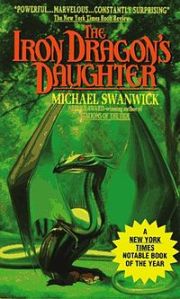 I’d read some reviews of The Iron Dragon’s Daughter on Goodreads, so I was forewarned that the author pulls a nasty trick on us around page 80. That still didn’t prepare me for how angry this book was going to make me.
I’d read some reviews of The Iron Dragon’s Daughter on Goodreads, so I was forewarned that the author pulls a nasty trick on us around page 80. That still didn’t prepare me for how angry this book was going to make me.
I picked up this book because it’s noteworthy for deconstructing a lot of stock fantasy tropes. It was published in 1993, when fantasy was deep in the ghetto of Tolkien knockoffs. A few years later, A Game of Thrones would start pulling the genre out of Tolkien’s shadow, and then Harry Potter would really get fantasy going again. But The Iron Dragon’s Daughter was a start. For one thing, this book has technology – at a time when most people had not heard of the word “steampunk.”
Jane is a young human who’s been kidnapped by the Unseelie Court and forced to live in Fairyland. She works as a child laborer in a robot dragon factory (they work like sentient fighter jets). One day, one of the dragons begins speaking to her. It offers to help her escape if she repairs it. This dragon is quite evil, but they strike an uneasy bargain and they get out.
At this point, you’d expect the story to be about Jane trying to get home while trying to cope with this dragon she can’t trust. You would be wrong. Over the course of a page or two, Jane becomes a miserable little crook bent on cheating, stealing, and fornicating* her way to the top of Unseelie society. She manipulates people. She lets her friends die to save herself. All of this would make for a fascinating villain if only there were any heroes in the story. There aren’t. All of the other characters are loathesome except for this one dude who keeps dying over and over and over again.
It’s not bad writing. In fact, it’s quite good (Swanwick has won awards for some of his other works). What we have here is a talented writer who is deliberately trolling his readers. The theme of the book is that life is pointless and meaningless, though it stops to poke some cruel humor at yuppie culture along the way.
I skipped ahead to see if Jane ever winds up in jail, which she so richly deserves. She does not.
Swanwick, you don’t have to be like this. You don’t have to rip your subject to bloody shreds to write effective satire. Take Terry Pratchett, for example. This guy pokes holes in everything, literally everything. He’s done dwarves quaffing mead in taverns to lost heirs to the throne to the post office to image compression algorithms to Robocop. But no matter where the books go, they always circle back to two main messages: 1. You will die eventually. 2. The human spirit (or dwarven or vampire or what have you) is worth something.
And frankly, that’s the sort of satire I’d rather read.
* Sex magic. She doesn’t care for her partners, but she does use them to acquire power.
